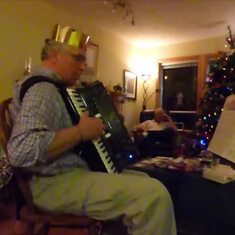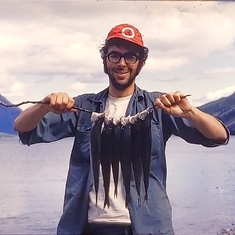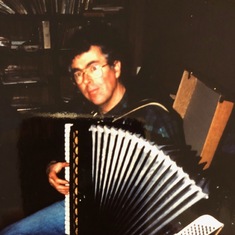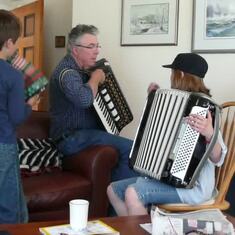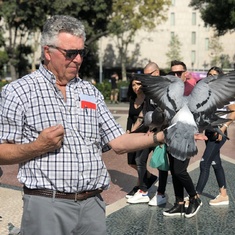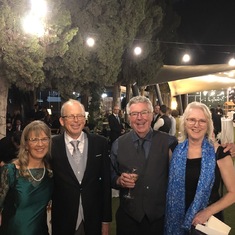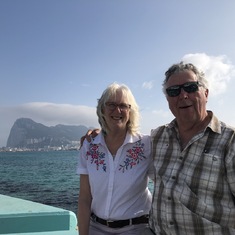The following speech was delivered at Raymond’s Celebration of Life in Cranbrook on 21 May 2022 by his eldest son, Michael. This printed version of the speech contains a few extra passages that were omitted from the original speech in the interest of time.
Thank you, Nancy, my wonderful aunt-in-law, for MCing this event here today.
* * *
“He was a quiet man, who kept mostly to himself” are words… used by no one… ever, to describe my father.
Pa, Ray, Raymond, Raymondo, Grandpa Nonno, Pappa Nonno, Demo, the Old Guy, Chief, Amigo, Dad. The man went by many names; and to each of us he meant something very different. Something special, unique, and memorable.
Dad was an extrovert to the full. He lived for the energizing charge of human contact. There wasn’t a stranger with whom he couldn’t (or wouldn’t) strike-up a conversation. And yes, he would listen to your story, but he was ever-keen to share one of his or proffer some advice – most of it good even if he was at times more of a ‘do as I say, not as I do’ kinda guy.
Though I view myself as a work-in-progress well into my 6th decade of life, Dad’s guidance has made me a better man, husband, and father. So, while my good friend Al Block has always been
amazed that I turned out the way I did given all the freedom I had growing up, I know that I turned out the way I did
because of my Dad, not in spite of him!
* * *
Though there were a few folks that drew his ire, by comparison, the list of people he called friends was a vastly longer one. And through him, I got to meet some real characters over the years: Pete Lum and his 50+ dogs roaming free in the bush; Ed Langlands the trapper and occasional bender-of-the-rules; Jack Cutts, Gordon Earl, and Hank Campsall the rugged cowboys; mountain-man Art Twomey; Keith and Arlene Smith the artists and lovers of life who were as close as family. And many who are still with us today, including Mel Bildfell who built two houses for us on the same foundation [
the first one burned down in an accidental fire before we had moved in].
* * *
My father was larger than life and he attracted similar personalities with all the magnetism of the Hadron Collider. Whenever he got together with his Fish and Wildlife Branch colleagues it was like being witness to a hurricane – frenetic energy and loud noises punctuated with every expletive known to the English and Italian languages.
It was a real eye-opener for a child to bear witness to such passionate and animated devotion to wildlife conservation. I’ve gone on to pursue my own career in wildlife ecology. Maybe they influenced me in a good way, maybe I had no choice, maybe both! I do know that my dear mother, Marilyn, put up with more than her fair share of vivacity. Bless her soul! Her life quieted down some after she married Gerry Oliver, my step father.
Mom always said fisheries biologists were a calmer lot by comparison.
I know Dad took comfort in the fact that the mother of his children was in good hands.
And speaking of wild and crazy guys [
some folks think Gerry looks like Steve Martin], Ken Sumanik was another fellow that added much to the spice of my youth. I remember my Dad being kinda leery about taking us to Disneyland as kids—the whole Bambi thing and the artificiality of it all just didn’t sit right with him. “
Amigo!,” Ken said, “
Just walk in there like you own the damned place!”
Well, I can confirm he did just that. In fact, he went into most places like he was a majority owner – seemingly nothing was off-limits to the man (I can’t say that everyone saw it his way, but in those few sticky situations, he was usually able to get by on his charm).
As for getting by on charm, however, the blue ribbons go to his younger brother, my Zio Leonard and my son, Devan. The two of those guys are really smooth operators.
And when the three generations of the Demarchi clan – the nonnos, zios, fathers, mothers, cousins, sons & daughters – took to the hills fully clad in Mossy Oak cammo every autumn; good times were in store!
* * *
Dad was always looking out for his sons. You could say he was part father, part coach, part friend, and part agent. For instance…
Maybe you didn’t know that my marriage to my beautiful wife, Catherine, was partly the result of a strategic plan drafted by my father and her aunt, Nancy some 33 years ago in a Victoria-Kootenay Region collaboration that was ahead of its time (we didn’t get married until some 9 years later). I’m not sure if he played a part in Don and Lisa’s marriage, but there is a photo in the record suggesting he did.
* * *
At his home on Cowichan Bay, he took a fellow named Marvin Johnny under his wing. Marvin was a member of Cowichan Tribes. He had four children and they all shared a bond with Dad. Marvin lived a very hard life. His time at Residential School left the scars and ongoing wounds of social trauma that is a tragic legacy of our nation’s history. Yet despite this, Marvin was upbeat and always quick to crack a joke. Dad and Harper (but mostly Dad) let Marvin use their dock for his many boats over the years. Marvin would show his appreciation by sharing some of his catch of prime crab, spot prawns, and the best clams I’ve ever eaten by far.
I’m pretty sure that Dad gave Marvin way more money for boat gas and repairs than he ever got in seafood, but for Dad to know that he was helping Marvin and his kids made it all worthwhile. Still, at one point it was getting to be a bit much with Marvin and his buddies coming and going all the time. So Dad said to Marvin that their little arrangement might need to take a bit of a break. To which Marvin replied, “
No more seafood, eh, Ray?
!”
The adventures of Marvin and Ray spanned many years and Dad always talked about writing a book called ‘
Marvin and His Boat’ as some of the tales would make for a great read. Sadly, Marvin died last fall not long after Dad.
No more seafood. * * *
He was a wise man who knew
value: the value of time shared, the value of a good meal, a good story, a shot of tequila with friends, the value of the words “please… and thank-you”, the value of friends & family, and the value of a life-partner. Harper, as difficult as it was to live with the man at times, I’m sure, I am hard-pressed to think of another couple that was more compatible. He was truly a fortunate man to have shared so many years of his life with you.
* * *
Insofar as it concerns my role as a big brother, safe to say, I failed a few inspections. But all was not lost. The bond I share with my brother, Don, was nurtured from an early age.
Back in 1973 just down the hill from here, I went across the street to play with some friends. Don followed me over and wanted to join-in. I told him to go home; he wasn’t invited. A few minutes later, the phone rang. My friend said “It’s your dad, and he sounds
really mad!” Dad summoned me home where I got an energized, old-school Italian-style lesson in the difference between friendship and blood.
With two brothers of his own – my Zio Dennis and Zio Leonard – with whom he shared close bonds, he was speaking from experience. I don’t think I ever got the two of those things mixed-up after that. It’s a lesson I’ve preached to my own kids over the years – albeit in a
slightly toned-down way.
And I’m happy to say, my efforts have paid off. My daughter Emma and son Devan have formed a bond that puts smiles on the faces of their parents and I know Dad was so proud of all four of his grandchildren: Emma, Alexandra, Devan and William.
* * *
I imagine most of you have been to Cabelas or other supersized outfitting shops – maybe you’ve even been to my father-in-law Gordon Aulenback’s 5-Star Yamaha dealership in Port Coquitlam. The assortment and array of hunting, fishing, camping, and other outdoor accoutrements defies description. Seemingly everything to make any outdoor adventure comfortable and memorable. Yet, there is one thing that those stores do not sell. Not in-store, not online, nowhere.
Time.
Taking time to use of all the goods – the shotguns, outboard motors, camping gear, the marshmallow roasting sticks – that’s on us. And my father did just that.
Looking back through the slides he took of our many trips and recalling my own memories of times he spent with my brother and me, I am humbled by his commitment to his sons. And he didn’t take the easy way out, no! In the early days, he cut no corners. We packed horses and hunted elk in the mountains, built treestands in the aspens of the Kootenay River-bottom, hunted fallow deer on Sidney Island (thank-you Peter Pearse), we scuba dived and gathered abalone off the West Coast of Vancouver Island (thank-you Al and Sheila Chambers), we hunted ducks in the Columbia Wetlands and on the Prairies. Granted, some of our hunts in the later years were cushier (thank-you 3 Bars Guest Ranch and Simon and Wendy Jones), but that was just fine by me!
One of the last bits of wisdom he offered us was, just as Don and my families were departing after a day’s visit, “Every day counts; every day matters”. Kinda obvious when you think about it; but truth, like beauty, can be like that—hidden at first, but then so clearly seen once your eyes are truly opened to it.
* * *
Dad and I fished salmon every summer. Our last trip was a week before he was diagnosed with the brain tumor that would prove fatal a year later. We were trolling near the international shipping lane of Juan de Fuca Strait in patches of fog. He ran the boat, I ran the gear. I told him to follow the compass bearing, but as I watched the fishing lines out the back of the boat and inspected the trackline on the chartplotter, I could see there was room for improvement. Though I was tempted in my usual way to give him a poke for this, I resisted and remained composed; after all, I was out on the calm waters of the Salish Sea with my 80-year-old father and we were catching cohos just like we’d done so many years before. Nothing else mattered. He taught me to appreciate that.
And while I couldn’t know that it was to be our final trip, when it comes to spending time with friends and family, I’ve always tried to live as though any time together could be the last. Not in a reckless way, but in a way that makes an extra effort to appreciate the precious, fleeting moments we share.
Our time on Earth is short; spend it well; savor it. After all, at some point, everything we do will be for a final time. In his life and death, he taught me to appreciate that too.
* * *
I thank you all for gathering here today to celebrate the storied life of Raymond Alexander Demarchi.
My father lived a rich life and you added so much to it. And while I know he, like the rest of us, wasn’t without his faults and frailties, his self-penned epitaph says it best: He cared and he gave a damn. And we’re all the richer for it.
Saluto Pappa Nonno!



